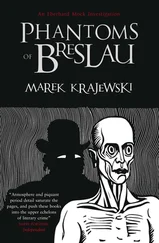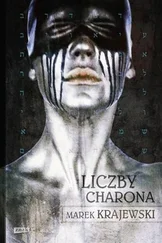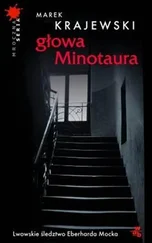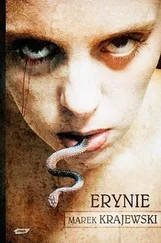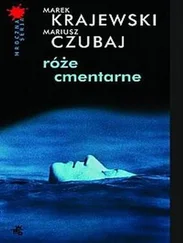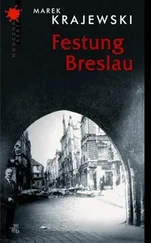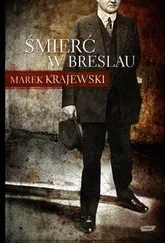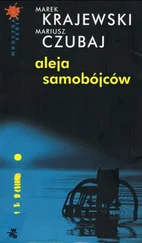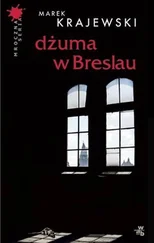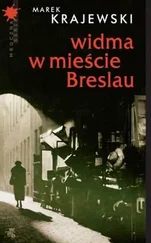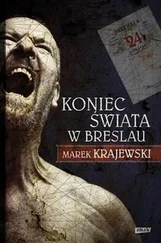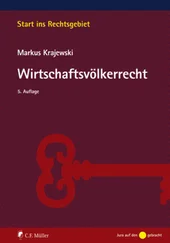Marek Krajewski - Death in Breslau
Здесь есть возможность читать онлайн «Marek Krajewski - Death in Breslau» весь текст электронной книги совершенно бесплатно (целиком полную версию без сокращений). В некоторых случаях можно слушать аудио, скачать через торрент в формате fb2 и присутствует краткое содержание. Жанр: Полицейский детектив, на английском языке. Описание произведения, (предисловие) а так же отзывы посетителей доступны на портале библиотеки ЛибКат.
- Название:Death in Breslau
- Автор:
- Жанр:
- Год:неизвестен
- ISBN:нет данных
- Рейтинг книги:3 / 5. Голосов: 1
-
Избранное:Добавить в избранное
- Отзывы:
-
Ваша оценка:
- 60
- 1
- 2
- 3
- 4
- 5
Death in Breslau: краткое содержание, описание и аннотация
Предлагаем к чтению аннотацию, описание, краткое содержание или предисловие (зависит от того, что написал сам автор книги «Death in Breslau»). Если вы не нашли необходимую информацию о книге — напишите в комментариях, мы постараемся отыскать её.
Death in Breslau — читать онлайн бесплатно полную книгу (весь текст) целиком
Ниже представлен текст книги, разбитый по страницам. Система сохранения места последней прочитанной страницы, позволяет с удобством читать онлайн бесплатно книгу «Death in Breslau», без необходимости каждый раз заново искать на чём Вы остановились. Поставьте закладку, и сможете в любой момент перейти на страницу, на которой закончили чтение.
Интервал:
Закладка:
He walked in absolute darkness, groping his way, frightening a few rats and wrapping his face in rolls of cobweb. He lost all sense of time and was being overcome by sleep when a distant reflection effectively overpowered his drowsiness. He easily identified the light of a street lamp penetrating a dusty window. He opened the window and, after a few unsuccessful attempts, managed to get outside, tearing the skin on his stomach and ribs in the process. He closed the window behind him and looked around. Thick bushes, from behind which came the patter of several people’s feet running here and there, separated him from the pavement and street. He lay supine on the lawn, panting. (I have to wait a few hours.) He looked around and found the ideal hiding-place. The balcony of the first-floor apartment was overgrown with wild vine hanging to the ground. Anwaldt crawled in and felt consciousness slip away.
The dampness of the earth and the surrounding silence woke him. Taking cover between the trees and benches of the promenade along the Oder, he crept to the car parked outside the Engineering College. He could scarcely drive. He was sore and lacerated. Climbing up to his floor, he clung to the banister. He did not turn on the light in his kitchen so as not to see the cockroaches. He drank a glass of water in one draught, threw his torn trousers down in the hall, opened the window in his room and collapsed on to the tangled sheets.
BRESLAU, TUESDAY, JULY 10TH, 1934
NINE O’CLOCK IN THE MORNING
On waking, Anwaldt could not lift his ear from the pillow. The congealed blood formed a strong adhesive. He sat up in bed with difficulty. His hair, plastered with blood, bristled stiffly on the crown of his head. His entire torso was grazed and covered with bruises. His heel ached; his swollen ankle was turning purple. Hopping on one leg, he made his way to the telephone and called Baron von der Malten.
A quarter of an hour later, the Baron’s personal physician, Doctor Lanzmann, arrived at Anwaldt’s apartment. After a further quarter of an hour, they were at von der Malten’s residence. After four hours, the patient, Anwaldt — having slept well, his head and torn ear dressed, his sprained ankle immobilized in bamboo splints, and yellow stains all over his body — was smoking a long, choice Ahnuri Shu Przedecki cigar and relating the previous night’s events to his employer. When the Baron — having heard him through — went out to his study, Anwaldt phoned the Police Praesidium and asked Kurt Smolorz to prepare all the material on Baron von Kopperlingk for six that evening. Then he got through to Professor Andreae and arranged to meet him for a talk.
Baron von der Malten’s chauffeur helped him downstairs and into the car. They moved off. Anwaldt asked, with interest, about practically every building, every street. The chauffeur answered patiently:
“We’re driving along Hohenzollernstrasse … On the left is the water tower … On the right, St John’s Church … Yes, I agree, it’s beautiful. Recently built … Here’s the roundabout. Reichprasidentenplatz. This is still Hohenzollernstrasse … Yes, and now we’re coming on to Gabitzstrasse. Yes? … You know these parts? We’ll go under the viaduct and we’ll be on your Zietenstrasse …”
The drive in the car gave Anwaldt the most enormous pleasure. (A beautiful city.) Unfortunately, his Adler had been burning in the high sun since morning and when he heaved himself in behind the steering-wheel, sweat poured down his shirt and jacket. He opened the windows, threw his hat on the back seat and pulled away with a screech of tyres, longing to cool himself by the current of air. With no success — his lungs filled with dry dust. As if this torment were not enough, Anwaldt lit a cigarette, drying his mouth out completely.
Following the instructions given by von der Malten’s chauffeur, he arrived at the College of Oriental Studies at Schmiedebrucke 35 without any problems. Professor Andreae was waiting for him. He listened closely as Anwaldt imitated the way yesterday’s assailant spoke. Although the lines the policeman repeated several times were short — (“How did you get in here? Show your invitation!”) — the professor had no doubts. The German-speaking foreigner at the Baron’s ball was most certainly a Turk. Pleased with his linguistic intuition, Anwaldt bade the professor farewell and drove on to the Police Praesidium.
In the entrance, he met Forstner. They exchanged glances and easily recognized each other: Anwaldt’s bandaged head and Forstner’s cut eyebrow. They greeted each other with feigned indifference.
“I see you didn’t spend last night at the Salvation Army on Blucherplatz,” laughed Smolorz, greeting Anwaldt.
“It’s nothing. I had a slight accident.” He glanced at the desk: Baron von Kopperlingk’s file lay there. “Not very thick.”
“The thicker one’s probably in the Gestapo archives. You have to have special connections to get in there. I haven’t got any …” He wiped his sweaty forehead with a chequered handkerchief.
“Thank you, Smolorz. Ah …” Anwaldt rubbed his nose nervously. “I’d be most grateful if you’d prepare a list of all the Turks who have lived in Breslau over the last eighteen months by tomorrow. Is there a Turkish Consulate here?”
“Yes, on Neudorfstrasse.”
“They’re bound to help you. Thank you, you’re free to go.”
Anwaldt was left alone in his cool office. He rested his forehead on the slippery, green surface of the desk and felt he was reaching the lowest point of the sinusoid — the critical point of his good and bad moods. He became painfully conscious of the fact that he reacted differently to other people: the furiously burning world outside released, in him, energy and action, the pleasant coolness of the office, surrender and resignation. (Each one’s a microcosmos connected to the movement of the universe; I’m not. I’m different from them. Haven’t I been told that ever since childhood? I’m an isolated mini-universe where multi-directional gravitation rules and welds everything into heavy, concentrated blocks.)
He abruptly got up, slipped his shirt off and leaned over the basin. Hissing with pain, he washed his neck and armpits then sat in his chair and allowed the water to run down his wounded torso in narrow streams. He wiped his face and hands on his vest. (Be active! Do something!) He picked up the receiver and instructed the runner to buy some cigarettes and lemonade, then closed his eyes and easily mastered the chaotic images. He tore them from himself and set them in order: “Scorpions in Marietta von der Malten’s belly. A scorpion on the Turk’s hand. The Turk killed Marietta.” This observation pleased Anwaldt with its self-evidence yet the prospect of ineffective work gave him cold feet. (The Turk killed the Baron’s daughter; the Turk guards Baron von Kopperlingk’s house; the Baron is protected by the Gestapo; ergo, the Turk has something to do with the Gestapo; ergo, the Gestapo is mixed up in the Baron’s daughter’s murder; ergo, I’m as weak and helpless as a child in the face of the Gestapo.)
A knock on the door. A kn-o-ck. The runner brought in an armful of bottles and two packets of strong Bergmann Privat cigarettes. The cigarette weakened him for a moment. He drank a bottle of the lemonade in one go, closed his eyes and again the thought-images became thought-sentences. (Lea Friedlander knows who pointed her father out to Mock and made a scapegoat of him. It could be someone from the Gestapo. If she’s going to be afraid to tell me, I’ll force her. I’ll withhold the morphine, terrorize her with the needle. She’ll do anything I say!) He rejected the erotic vision “she’ll do anything I say” and got up from his desk. (Be active!) He paced the room and voiced his doubts out loud:
Читать дальшеИнтервал:
Закладка:
Похожие книги на «Death in Breslau»
Представляем Вашему вниманию похожие книги на «Death in Breslau» списком для выбора. Мы отобрали схожую по названию и смыслу литературу в надежде предоставить читателям больше вариантов отыскать новые, интересные, ещё непрочитанные произведения.
Обсуждение, отзывы о книге «Death in Breslau» и просто собственные мнения читателей. Оставьте ваши комментарии, напишите, что Вы думаете о произведении, его смысле или главных героях. Укажите что конкретно понравилось, а что нет, и почему Вы так считаете.

